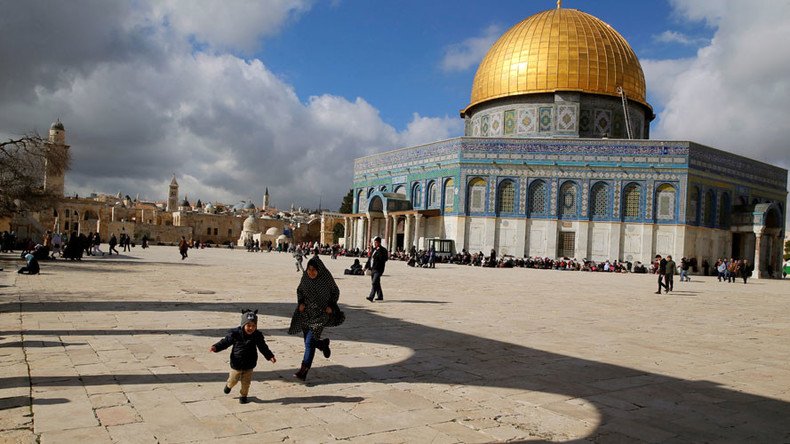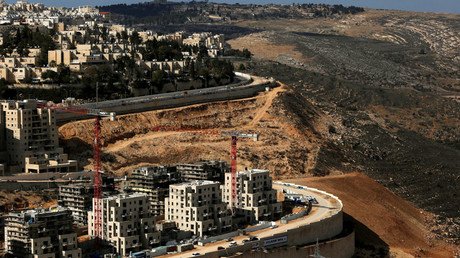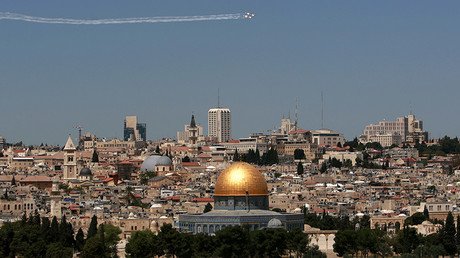Is Trump about to spark a Third Intifada in Palestine?

If reports are to be believed President Trump is planning to relocate the US embassy in Israel from Tel Aviv to Jerusalem, it will almost certainly be the catalyst for the explosion of a Third Intifada.
Though Western news pundits and journalists outdid themselves in claiming Trump’s election was being celebrated in Moscow as if Russia had most to gain from his presidency, the world leader with most reason to welcome Trump’s election was, in fact, Israel’s Prime Minister Benjamin Netanyahu.
Isolated on the international stage for his government’s intransigence where Palestinian human, civil and national rights are concerned, and having a terrible relationship with Obama, Trump has arrived in Washington proclaiming near-unconditional support for Israel’s current leader and government.
Recently, Netanyahu’s government has been condemned by the UN Security Council over the network of expanding illegal colonies on occupied Palestinian land, commonly referred to as settlements. Its embassy in London was embroiled in a scandal over the expose by undercover Al Jazeera journalists of a plot to undermine various British politicians and ministers over their opposition to those illegal colonies, and of course, the consistent and ongoing obduracy when it comes to the establishment of a viable Palestinian state. Take all this together, and the growing pariah status of the Netanyahu government was self-evident.
However, with Trump’s entry into the White House, all this is set to change. The 45th President has made no secret of his opposition to the Iran nuclear deal, designed to prevent the Iranians developing a nuclear weapon in return for the lifting of international sanctions. Negotiated between the Iranian government and the five permanent members of the UN Security Council plus Germany (p5+1) in 2015, the agreement counts as one of the Obama administration’s few foreign policy successes.
During the negotiations leading up to the agreement, Netanyahu caused controversy by attempting to scupper it, going so far as to appear at a joint session of the US Congress in Washington to speak out against it without first clearing his appearance with the White House, as per the usual protocol when it comes to visiting foreign heads of state. It was, in conjunction with congressional Republicans, a deliberate insult and clear attempt to undermine a sitting US president.
The key point is that despite Trump’s bluster about Iran and the Iran deal, the alternative to it is war. To remind both him and those of the same mind, such a war would make the current chaos and conflict in the region tame by comparison.
Here it’s worth recalling that the US failed in its objective of turning Iraq, a country starved to its knees during thirteen years of brutal sanctions, into a pliant US satellite. Its military forces were unable to pacify the country, as they have been unable to pacify Afghanistan, which is why the incoherence and recklessness of Trump’s foreign policy pronouncements on Iran provide legitimate cause for trepidation.
The two states in the Middle East most responsible for creating instability and conflict in the region over its recent history are Israel and Saudi Arabia. Both were founded and exist on a sectarian basis, and both have regional hegemonic agendas. Both also view Iran as the greatest obstacle when it comes to achieving those plans. When it comes to Palestine only the most deluded or dishonest still regards the prospect of a two-state solution possible. Netanyahu leads the most extreme government the country has had in many years, made up of assorted ultra-nationalists and even racists where the status of the Palestinians are concerned.
Under international law, Jerusalem is not and never has been part of Israel. Its agreed status under the UN Partition Plan of 1947 was a separate ‘international city.' However, in the course of what Israel refers to as its war of independence and the Palestinians as ‘al-Nakba’ (the Catastrophe) in 1948, control of the city was split between Israel and Jordan, over West and East Jerusalem respectively. This changed after the Six Day War of 1967, when the Israeli’s took control of the entire city, though without UN or international sanction. Since that time, the Palestinians have considered East Jerusalem to be the capital of any future Palestinian state, even though the Israelis have been destroying Palestinian homes and building settlements across this part of the city.
It is hard to know if Trump and his team are aware of the consequences if the US becomes the only country to locate its embassy in Jerusalem, or if they know full well what the consequences will be and don’t care. Regardless, those consequences will be to unite the Palestinians in resistance to the move and to the Netanyahu government such as they have not been united since the First Intifada of 1987-1993.
It would also place Russia in a sensitive position, given the influence and trust it now enjoys as a force for stability in the region. Indeed it was no accident that Moscow recently hosted high-level talks between Fatah, Hamas, and Islamic Jihad that concluded with the formation of a united Palestinian National Council, whose writ will run both in Gaza and across the occupied West Bank.
Mr. Trump cannot logically describe the foreign policy of his predecessor in the Middle East a disaster but then take decisions that are equally disastrous. His administration needs to understand that justice for the Palestinian people is not an optional extra. Justice for the Palestinians is a non-negotiable condition of peace and stability.
The statements, views and opinions expressed in this column are solely those of the author and do not necessarily represent those of RT.















